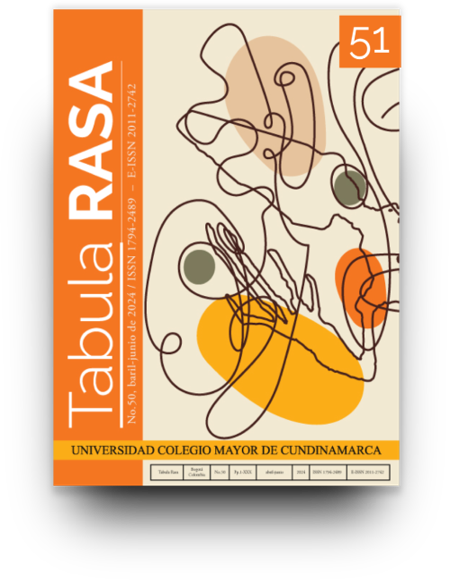Animal Ethics as a Field of Political Figurations
La ética animal como campo de producción de figuraciones políticas
Show authors biography
This article reads the field of animal ethics as a space for producing political figurations. Firstly, it addresses the understanding of animal ethics not only as a field of study, but also as a field of forces in which various historically and politically loaded concepts emerge. These concepts are perceived as figurations, that is, ways of alluding to reality that necessarily imply its alteration. Secondly, we examine the figurations of speciesism, the animal as a sentient being, as a subject (of some life), as a slave and a subject susceptible of liberation and, finally, as a sentient-conscious subject. The article concludes with a dialogue in which clarifications are made on the problem of sentience and themes such as veganism, subjection and animal citizenship.
Article visits 82 | PDF visits 60
Downloads
- Ávila, I. (2024). Familia multiespecie y lazo afectivo como «base de la sociedad»: lecturas jurídico-políticas. Tabula Rasa, 49, 109-132. https://doi.org/10.25058/20112742.n49.07
- Ávila, I. (2022a). Las ocho inflexiones de los animalismos situados. Fractal, 91. https://mxfractal.org/articulos/RevistaFractal91Avila.php
- Ávila, I. (2022b). Esa metafísica que no es Una: materialismo inmanente, conocimientos corporizados y formas de vida posthumanas. Desde Abajo.
- Ávila, I. (2019). Los animales ante la muerte del Hombre: (tecno)biopoder y performances de la (des)domesticación. Tabula Rasa, 31, 251-268. https://doi.org/10.25058/20112742.n31.10
- Ávila, I. (2018). Donna Haraway y Friedrich Nietzsche: resonancias epistémico-ontológicas. En (Des)órdenes (inter)culturales (pp. 169-188). Universidad Nacional de Colombia.
- Ávila, I. (2017). Rebelión en la granja: biopolítica, zootecnia y domesticación. Desde Abajo.
- Ávila, I. (2016). De la Santamaría y las corralejas a la metafísica occidental, y viceversa (Seguido de Ética, política y animalismo). En Ávila, I. (comp.). La cuestión animal(ista). (pp. 45-72). Desde Abajo.
- Ávila, I. (2014). El nomadismo filosófico de Rosi Braidotti: una alternativa materialista a la metafísica de la presencia. Tabula Rasa, 21, 167-184. https://doi.org/10.25058/20112742.9
- Ávila, I. (2013). De la isla del doctor Moreau al planeta de los simios. La dicotomía humano/ animal como problema político. Desde Abajo.
- Ávila, I. & González, A. (2022). Glosario de resistencia animal(ista). Desde Abajo.
- Ávila, I. & González, A. (2014). Resistencia animal: ética, perspectivismo y políticas de subversión. Revista Latinoamericana de Estudios Críticos Animales, 1(1), 31-72. https://revistaleca.org/index.php/leca/article/view/4
- Bourdieu, P. (2000). Sobre el poder simbólico. En Poder, derecho y clases sociales (pp. 87- 100). Desclée de Brouwer.
- Braidotti, R. (2000). Sujetos nómades. Corporización y diferencia sexual en la teoría feminista contemporánea. Paidós.
- Cambridge Declaration on Consciousness. (2012). F. Crick, C. Koch, S. Edelman, P. Singer, et al. En: The Francis Crick Memorial Conference: Consciousness in Humans and Non-Human Animals. University of Cambridge. https://fcmconference.org/img/CambridgeDeclarationOnConsciousness.pdf
- Cochrane, A. (2018). Sentientist Politics A theory of global inter.species justice. Oxford University Press.
- Congreso de Colombia. (2016). Ley 1774 de 2016. Por medio de la cual se modifican el código civil, la ley 84 de 1989, el código penal, el código de procedimiento penal y se dictan otras disposiciones. https://www.funcionpublica.gov.co/eva/gestornormativo/norma.php?i=68135
- Despret, V. (2012). What would animals say if we asked the right questions? University of Minnesota Press.
- Donaldson, S. & Kymlicka, W. (2011). Zoopolis A political theory of animal rights. Oxford University Press.
- Donaldson, S., Kymlicka, W. & Blatter, C. (Eds.) (2020). Animal labor A new frontier of interspecies justice? Oxford University Press.
- Francione, G. (2000). Introduction to Animal Rights: Your Child or the Dog? Temple University Press.
- Harrison, R. (1964). Animal machines. Vincent Stuart Publishers.
- Horta, O. (2004). Una tipología del especismo Criterios distintivos y significación moral. En J. Riechmann (ed.). Ética ecológica propuestas para una reorientación (pp. 145-162). Editorial Nordan-Comunidad.
- Quijano, A. (2014). Colonialidad del poder y clasificación social. En Cuestiones y horizontes: de la dependencia histórico-estructural a la colonialidad/descolonialidad del poder. (pp. 285-327). Clacso.
- Linzey, A. (1996). Los animales en la teología. Herder.
- Regan, T. (2004). The case for animal rights. University of California Press.
- Regan, T. (2003). Animal rights, human wrongs: an introduction to moral philosophy. Rowman & Littlefield.
- Ryder, R. (2022). Especismo (1970) (Seguido de Especismo: 50 años después). En I. Ávila & A. González. Glosario de resistencia animal(ista). Desde Abajo.
- Singer, P. (1975). Animal liberation. Random House.




